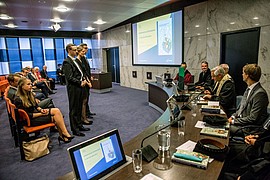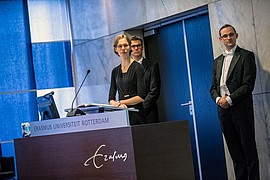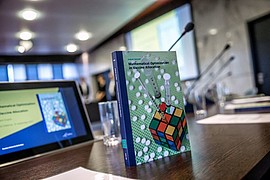PhD Defence: Evelot Duijzer

In her dissertation ‘Mathematical Optimization in Vaccine Allocation’, ERIM’s Evelot Duijzer analyses three decision problems in the field of vaccine allocation: the allocation of a limited vaccine stockpile to fight a sudden outbreak, the allocation of prepandemic vaccines in an age-structured population and the allocation of a limited budget over multiple vaccine types.
Evelot Duijzer defended her dissertation in the Senate Hall at Erasmus University Rotterdam on Friday, 15 September 2017 at 9:30. Her supervisor was Prof. Rommert Dekker and her co-supervisor was Dr Willem van Jaarsveld. Other members of the Doctoral Committee are Prof. Albert Wagelmans (Erasmus University), Prof. Joris van van de Klundert (Erasmus University), and Prof. Jacco Wallinga (LUMC, RIVM).
About Evelot Duijzer

Evelot Duijzer (1989) obtained her Bachelor’s degree (cum laude) in Econometrics and Management Science from Erasmus University Rotterdam in 2011. In 2013 she received her Master’s degree (summa cum laude) in Management Science at the same university, with a specialization in Quantitative Logistics and Operations Research. Evelot joined the Erasmus Research Institute of Management (ERIM) in September 2013 as a PhD student under the supervision of prof. dr. ir. Rommert Dekker and dr. Willem van Jaarsveld. She worked on resource allocation problems in infectious disease epidemiology, in particular on vaccine allocation. Her work has been published in Mathematical Biosciences and Omega. She has presented her research at various national and international conferences, including INFORMS Healthcare, Medical Decision Making and Vaccine. Her research interests include operations research, optimization and health care logistics. During her PhD project she assisted in the courses Introduction to Statistics and Simulation and supervised several bachelor theses. In 2016 she obtained her University Teaching Qualification.
Thesis Abstract

Vaccination is one of the most effective ways to prevent an outbreak of an infectious disease. It results in immunity for the vaccinated individuals, but also reduces the infection pressure for unvaccinated people. In the past years, the Operations Research/Operations Management community has shown a growing interest in the logistical aspects of vaccination.
In this dissertation, we structure the literature on vaccine logics. Using a supply chain perspective, we describe the decision problems and identify future research directions. In the remainder of the dissertation, we analyze three decision problems in the field of vaccine allocation: the allocation of a limited vaccine stockpile to fight a sudden outbreak, the allocation of prepandemic vaccines in an age-structured population and the allocation of a limited budget over multiple vaccine types. We use mathematical optimization to find solutions to these complex allocation problems.
We contribute by providing insights into the structure of the solutions that could not be obtained numerically. Our results show that optimality and equity are often far apart. Policy makers therefore need strategies in which they balance between efficiency and equity. The simple models and analytical insights in this dissertation provide a valuable starting point for analyzing such strategies..
Photos: Chris Gorzeman / Capital Images


